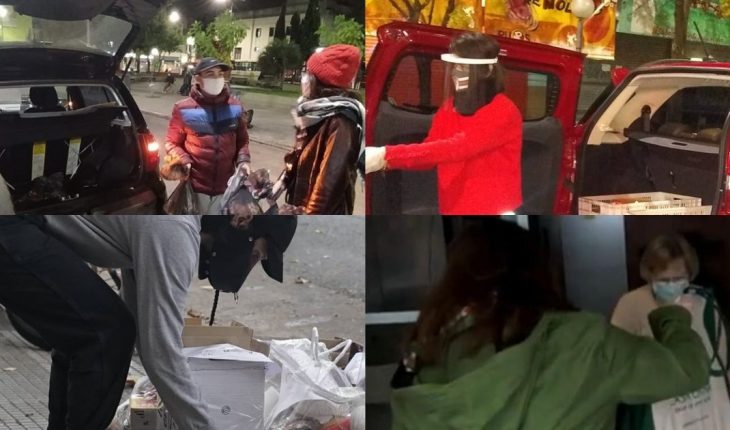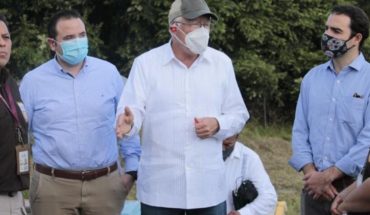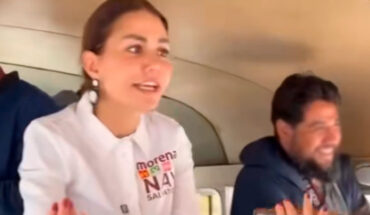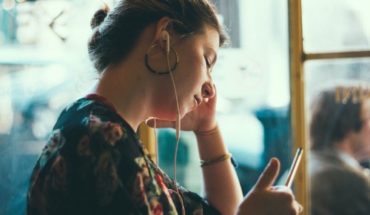As every weekend, Natalia puts on the barbijo, prepares her cart and goes shopping; carries the list with everything you have to buy: fruit, vegetables, rice packets, tomato cans. He comes home, disinfects them carefully, and warns them by phone that he is ready to go, not without first saying the keyword. Only there he prepares the products in a bag, takes the elevator from his building, walks a few meters and takes them to the house of Elisa, his 81-year-old neighbor, who waits for her at the door with her sky-covered. Natalia Magnani volunteers, and like her, thousands of people every day attend risk groups in the pandemic. In his case, it is part of the program “Greater Care”, presented by the Government of the City of Buenos Aires, which had the participation of more than 38 thousand neighbors, who responded to the request of more than 11 thousand older adults. According to the initiative’s official website, 91% asked for assistance for logistics issues, 3% for telephone assistance and 4% for both. In the case of Natalia, she deals with supermarket purchases, food for her cats or pharmacy remedies. The sequence became an all-Saturday quarantine routine on the streets of Villa Crespo: “Today I turned to the prize of bringing things to Elisa, he gave me a very good apple cake, ideal for the afternoon matte,” he says. They both live on the same block, although they didn’t know each other before: “We are very close, hopefully we can visit each one in our homes soon, luckily now I have a new neighbor friend,” she continues.
Natalia with Elisa Photo: Natalia Magnani
Older adults are the largest risk group against the coronavirus pandemic, and yet 85.5% came out at least once during quarantine in Buenos Aires City, according to a study conducted by the Faculty of Psychology of the UBA. 70% said they went out to buy, 48.2% to go to the bank and 26.2% to take care of themselves for health. In this scenario, Natalia highlights the need for volunteering and accompaniment: “Perhaps isolation may end soon but some people are going to need to continue with this containment for a while,” she continues. CABA is at the heart of the pandemic: so in the last few hours there were 564 new cases of COVID-19, of which 274 belong to City. According to Horacio Rodríguez Larreta, head of government, the virus increased by 100%. According to the latest reports, there are no more porteño neighborhoods without cases. Retiro, with 32% of cases, continues to lead the ranking of neighborhoods with the most infected, with a rate of 3,321.41 cases per 100 thousand inhabitants, mainly in the Padre Mugica neighborhood, with 773 more cases compared to the previous week.
In this hot area works the Group Volunteering Without Borders, which meet in Villa 31, Villa Soldati, Bajo Flores and Don Torcuato, where they bring food, hygiene, cleaning, school kits and minions, as well as different workshops. According to the volunteer Yamila Hoyos, about 100 people work volunteer in the different popular neighborhoods of Buenos Aires.Every day she has to go to the neighborhoods, Yamila gets up at 6:30 in the morning in Caballito to arrive at 9 to offer breakfast in Don Torcuato to big and young, chat a little, as well as connect through recreational activities , such as art workshops, crafts, or discussions about education or work. “To volunteer for me is to be part of an exchange of value with someone else. It is to provide something that you have to give, be it your time, your listening, your knowledge; and at the same time receive the value of another person,” he says. In neighborhoods where the size of the pot is small, where water is missing to wash hands, where social estrangement is hindered, in the midst of overcrowded and precarious conditions, containment groups, canteens and community centers become the engine of survival and the first line of containment: “The places that catered to 150 people, suddenly cater to more than 200. And that implies greater mobilization and more concentration of the vecinxs. That’s why there are dining rooms that have to close and look for another way to provide bags of food or food to keep it to each family. The foodies are leaving their life and health to continue their task and commitment to the neighborhood,” he says.
Volunteering & Quarantine Photo: Instagram Volunteers Without Border
At the time of the ward, sanitary measures include using beards and gel alcohol for up to two hours. How does the virus affect the popul economyar?” The neighborhoods of the 31st neighborhood tell us that there is practically no control: the chicxs come out and gather in the playón; or chicx is sent to do the shopping because parents have to go out to work and often that chicx has to go home where they live with people who are patients at risk, and that generates a domino effect. Because because you don’t have hygiene elements, how do you do it? There are water issues coming from last year and still persisting. No water, impossible to sanitize. It’s a whole set of factors that makes if you don’t catch it, it’s really because you’ve been lucky,” he says. In this way, the coronavirus reinforces historical inequalities and structural problems and adds to a series of claims and violence that suffer in the neighborhoods, which highlights the role of volunteering: “In times of pandemic the role of volunteering can make a difference, because leaving this health emergency situation without human support, without solidarity, without empathy or linkage with the various realities that exist within our community”, evaluates. In this sense, women were historically designated to unpaid work, with care tasks as well as popular pots in the neighborhoods: “The case of Ramona Medina (who was not the only one) made it very clear: the pandemic is not killing, it is dissatisfly, indifference. The main complaint is to the state: that bags of food, cleaning and hygiene kits are distributed and that those who are infected are provided,” he says. As we can see, complying with mandatory quarantine is not the same for everyone, since for many staying at home is not an option. In this sense, the pandemic shows the risk situation faced by the transvestite collective, whether socially, economically or structurally, due to the difficulty of access to basic rights such as health, formal work or housing. “When the pandemic issue began we started calling les compas trans and the responses were alarming: ‘I have food for three days’, ‘we are about to be evicted'”, explains Luciana Viera, transfeminist activist and communications manager of the Mocha Celis Baccalaureate, who volunteers at “Teje solidarity”, a care initiative they presented for trans people in an emergency situation. The campaign is divided between donors and ‘xadrines’, who make purchases of food or hygiene products; according to Luciana, at that time they establish a geographical match and contact both parties for future follow-up. Today, they make massive distributions in AMBA, “with more than 700 companions and 200 volunteers”. From her position, Luciana spends 100% of her day on the initiative: either to answer emails or be attentive to a request for help. “It’s really a lot of physical and emotional work, a lot of time burden, without having a pay. But the need of the collective cannot wait; one more hour of work for me is a minute worth a life or a horrific moment to a company that’s needing it. In order of priorities, the partner who needs it will always be,” he confesses.
Solidarity Weeding ? Photo: Instagram @mochacelis
How does the pandemic affect the community? “The situation is completely alarming, Luciana says, “there are statistical data that emerge from the book ‘The Butterfly Revolution’ that we created in high school that express that 5.9% of the trans people have university studies, and 70 or 80% is dedicated to prostituting work, sex work. So quarantine affects 100%, not being able to do your job and having no income,” he says. It also emphasizes: “Because we do not have access to a proprietary guarantee, we find it very difficult to purchase a normal rent, then most cannot afford it and end up living in precarious places, in overcrowded conditions (…) It also affected many companions who are in hormone treatment or treatment of chronic diseases, because they could not have access to a computer to take out the permit, or many bars who suffer institutional violence, in health, work, with cross-dressing, silence in the media.” I believe that we are one of the most affected and vulnerable populations because we are an unseen population. Quarantine exposed and empowered in what position we are as a collective with respect to the rest of society and deepened many claims,” he says. In this sense, it agrees that there is a romanticization of quarantine from a class perspective, as well as gender: “More than anything because ‘stay home’ part of an assumption that we all have a house and a guaranteed roof and this is not the case. Many times that house they raise if this but precarious. So that Romanization of calor of home, family is more thought for a heteronormative, cisesexsta, binary, family type look. Many classmates don’t need to stay home, because they need to go out on the street to generate their income.”
Volunteering & Quarantine Photo: Pride and Struggle
In this scenario, volunteering for her is having empathy with the other person regardless of their condition, identity or sexual orientation, weaving networks to raise awareness and deepening the claims for public policies and human rights of LGBT+ groups. In the same vein, the organizations 100% Diversity and Rights and La Rosa Naranja, together with the Pride and Struggle space, presented “We take care of each other”, a campaign that seeks to assist and accompany LGBTI+ people in extremely vulnerable situations from all over the country. In this way, they deliver food and hygiene products, accompany in situations of limit emergency, regularize documentation of migrants, report acts of police violence, provide assistance to registration to social programs. “We were able to bring basic needs to all trans women in a prostitute state, and to all diversity, we were able to remedy the vulnerability of the collective. If this continues, we will continue to fight,” says one of the volunteers.***Not far from Capital but with a completely different set, in the Conurbano bonaerense, meanwhile, the cases of coronavirus do not give a truce, and hits once again the most violated sectors. That’s why Santiago Tisera meets twice a week with a group of young people to take night tours in Morón, where they share time and food with people in street situations. It is the program “Solidarity streets”, where Tisera is a ‘volunteer tour’ – which adds to transport and kitchen volunteers. Message goes, message comes, organize by WhatsApp and divide all the tasks: they prepare their thermos with something hot, withdraw donations, start cooking the five or six kilos of food. Every Wednesday and Sunday, at 20 o’clock, they gather to go to La Roche Square, in front of the train station, where they contact approximately 200 people. With disposable gloves, bottle caps and diluted alcohol, some volunteers prepare the food to distribute the three pots with hot stew alongside the drink, dessert, and infusions. Meanwhile, others are responsible for walking the streets of the center and meeting people who cannot approach the square; even though they originally walked for about two hours, the sanitary emergency had to reduce it to half an hour and by car, and had to suspend all special date or birthday festivities.” The goal is to get closer so we can get to know them better and be able to help them in the way they need, getting involved in their stories,” he says. Volunteering, for him, represents an act of empathy and an experience that “opens your head”: “Wanting to contribute something, whatever you can from where you are. It is to know up close the reality that one so often ignores. ‘A lot of small people, in small places, doing small things, can change the world” is just as true as ‘every person is a world’, so our task is to try to change the world, one world at a time.” In times of pandemic, their work is even more necessary than ever: “If we don’t go, no one cares about them. People are counting on us, and it is our commitment and challenge to meet that expectation, just as in this context it is also to do everything necessary to take care of us among all (…) the community organization, from NGBs to solidarity pots organized by the same neighbors, are to be able to alleviate all these obstacles, but sometimes even that does not reach for the really desperate situations that thousands of families live” Express.
Pandemic Volunteers Photo: Instagram Solidarity Streets
What is the situation in the Conurbano in the face of the pandemic? “It’s where the pandemic makes the most dent,” assesses Tisera and goes on- it’s a lie that it’s a context that affects everyone equally, starting from the fact that slogans like ‘stay at home’ don’t make any sense to all people who have nowhere to stay, nor does it do any good when where you live, the supply of basic hygiene conditions is not met even to be able to have a decent life.” He then continues: “All these people, many indeed, who are systematically turned their backs, who are excluded, invisibilised and stigmatized, are still denied all kinds of aid, while even being punished for not being able to comply with the restrictions of isolation. The lack of usual opportunities adds impediments even to be able to try to earn the mI ngo daily, without giving him any kind of answer or alternative.” In “Solidarity Holding,” Jennifer’s experience is similar. From the west, before the pandemic his task was to coordinate and prepare snacks; however, as everyone had to adapt their routine to the new circumstances: “We updated our donation system to do so from home, and with the necessary precautions we decided to go out again on the streets but this time delivering bags of merchandise so that people could cook and eat in their homes. In addition, we add hot food for people who sleep on the street. This was all very new for everyone,” he said. For her, delivering a cup of coffee or cooked matte can be done by anyone. But volunteering is going one step further: “The important thing is to give people contention, befriend, hug and listen. You start to find your place, to get attached to people and to the little ones. There is a time when something inside clicks you, crosses you and volunteering becomes a way of life,” he confesses.
Volunteering & Quarantine Photo: Instagram Solidarity Stamina
Then follow: “When quarantine came, we thought it was only going to be 15 days, and as it spread, we thought about how our people were holding out for so long. We realized how privileged we are to have a house with a full fridge and someone to chat with. Our people, quarantined or not, were going to keep going out on the street because somewhere they have to take out in order to give the children food.” It’s impossible to ask someone they don’t have to eat, to wait for help that never comes. The government’s financial aid does not include people who are totally invisible. If they stay waiting in their homes, they don’t get killed by the pandemic, they’re starved. If anything taught us all this, it is that the presence of the state is essential to try to bring these two very unequal realities that we have closer together. The pandemic doesn’t distinguish social classes, but vulnerability does. Few can stay in their homes watching Netflix, with the peace of mind that they open the fridge and have something to eat. Not to mention the anxiety and anguish of people who are alone,” he reflects.*** Meanwhile, volunteer groups in the interior of the country face a different situation, in the face of the easing of quarantine and the return of activities in some provinces. However, his work remains fundamental, in the face of social and economic inequality which – unfortunately – is not new.” We have the possibility of being outdoors and quarantine is more bearable, but it has clearly produced a sharp retraction of economic activity considering that 70% of the population lives off tourism. In my case, I have a bicycle rental venture and since March 15 we stopped depositing money”, says Claudio Sacramento, in charge of a dining room located in Puerto Iguazu, Misiones. Belonging to the Iguazu Social Collective, every day they serve matte cooked with milk, milk chocolate, homemade bread, bills or cookies. Because of the pandemic, they organize community lunches for approximately 40 families. They are also available to neighbors and neighbors throughout the day assisting in arrangements with ANSES, distributing donations of clothing or requesting a medical shift. Thus, the picnic is transformed into a space of meeting, containment and consultation.
Volunteering & Pandemic Photo: Instagram Social Collective Iguazu
How does the pandemic affect the province? “In Misiones, it put white on black the needs of a high percentage of the population and informality when it comes to work activity. We came from a food emergency approved in September 2019, with a situation of contagion of significant dengue, and lack of basic services in these sectors, which also contributes little to the need for health care,” he says. With regard to flexibility, he believes: “We are fortunate that cases of contagion are few and that several activities have already been reactivated, which allows some places to be reactivated. Tourism is clearly going to be the last activity to start and, for our city, this is very bad news. The fall in wages is felt in the fall in sales of the commercial sector and, in the case of Iguazu, we cannot see a horizon of immediate reactivation. That’s why it’s important that all sectors are active in the emergency.” “It is more than clear that urban reality and big cities differ from the interior of the country. There is no home office here, we have to work every day so that all families have the food issue resolved, that is where we have to put the investment of the state”, says. Looking ahead, he aspires to a new normal: “The world is going to resurface even poorer and there will be disputes. A distributive matrix needs to be worked on.”***As the virus continues to advance in the country, another side of the pandemic, the wave of solidarity, is also growing. In times of isolation, the work of volunteers and volunteers becomes essential and shows that advertising slogans are necessary but transgress the personal circle to become a social and structural problem. But they will also be in the future, when quarantine is over, when we reach the “new normal”, where it will be necessary to rethink the reality that we live from networks of collective care, reflect on the formation of social bonds and think about the realities that the coronavirus evident.
In this note:





